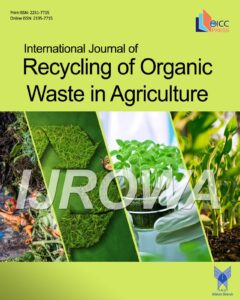Effect of substrates consisting of organic waste processed by diplopods on production of lettuce seedlings
Authors
-
Luiz Fernando De Sousa Antunes
*
 1
1
-
Dione Galvão Da Silva
 2
2
-
Marco Antonio De Almeida Leal
 3
3
-
Maria Elizabeth Fernandes Correia
 2
2
Abstract
Purpose To characterize substrates made of millicomposts produced from a mixture of cow paw leaves (Bauhinia sp.), grass clippings (Paspalum notatum), banana leaves (Musa sp.) and cardboard submitted to processing through the activity of millipedes Trigoniulus corallinus for 90, 125 or 180 days. The efficiency of producing lettuce seedlings using these substrates was compared to a control substrate of earthworm humus, fine coal and castor cakes.
Method Chemical and physical characteristics of the substrates, seedling growth and clod stability were evaluated 28 days after sowing. Substrate pH and electrical conductivity during seedling development were also recorded.
Results The millicompost with the shortest processing time (90 days) contained lower levels of macronutrients (N, Ca, Mg, P and K) compared to the millicomposts with 125 and 180 days of processing and the control substrate. Subsequently, the lettuce seedlings produced on 90-day substrate showed less vegetative development. The millicomposts with 125 or 180 days of processing did not differ from the control substrate in respect to lettuce seedling development. Clod stability was greater in the control and the 180-day millicompost substrates.
Conclusion The results show that it is possible to obtain efficient substrates for lettuce production using a mixture of various plant residues with cardboard processed through the activity of millipedes for a minimum of 125 days.
Highlights
- Diplopods are capable of transforming plant residues into organic compost.
- The millicompost can be used as a substrate in the production of lettuce seedlings.
- Lettuce seedlings develop best in millicomposts of 125 and 180 days.



